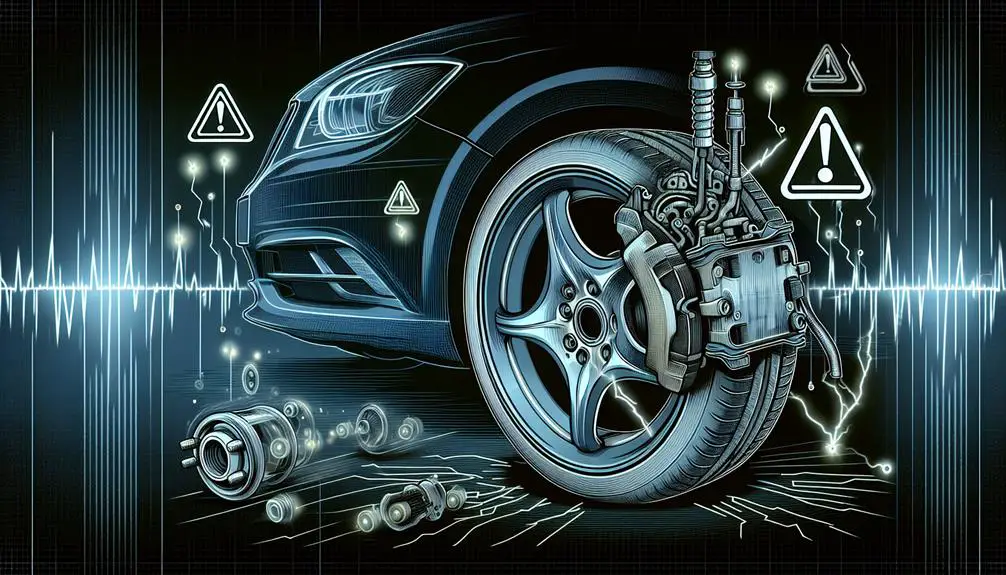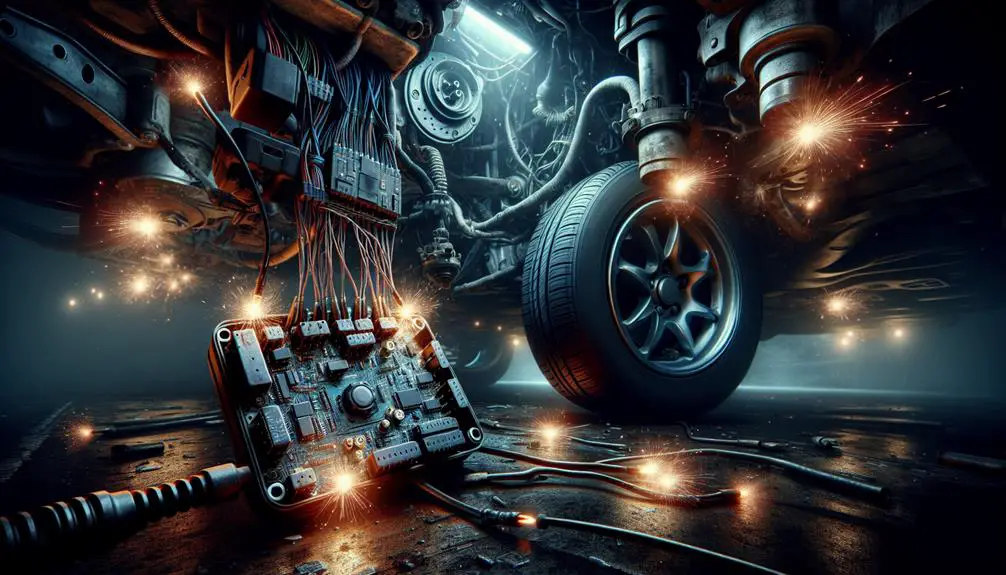- Faulty wheel speed sensors
- Worn brake components
- Electrical issues
- Contaminated brake fluid
- ABS module failure
This range of factors can contribute to anti-lock brake problems and should be checked and addressed to ensure the proper functioning of the system.
Faulty Wheel Speed Sensors

Wheel speed sensors are important for the anti-lock braking system (ABS) to work right. They can fail because of dirt or wire damage. These sensors check each wheel's speed to help the ABS stop the car without the wheels locking up. If they don't work well, your car's safety could be at risk.
Dirt can block these sensors, making them unable to measure wheel speed correctly. This can mess up the ABS. It's good to clean them often, especially if you drive on rough roads.
Wire damage is also a problem. Wires to the sensors can break or corrode over time, which stops the ABS control unit from getting the right signals. This could be from normal use, animals, or small accidents. Check the wires often and replace them if they're damaged.
If you ignore these problems, your ABS mightn't work right, and the ABS warning light could turn on in your car. If your brakes act weird or the warning light comes on, check your wheel speed sensors. Fixing these issues early can prevent bigger, more expensive repairs and keep your braking system in good shape.
Worn Brake Components
ARTICLE TITLE: Reasons for Anti-Lock Brake Issues
CURRENT SUBTOPIC: 'Worn Brake Components'
Worn brake components can cause problems with your car's anti-lock braking system (ABS). These parts wear down over time, affecting how well your car stops. It's important to recognize signs of wear and know which parts to check to avoid danger.
Pay attention to these brake components:
- Brake Pads and Shoes: These parts absorb most of the braking force. When they get thin, your car doesn't stop as well. Thin pads can make the ABS work too hard, possibly leading to failure.
- Rotors and Drums: If these are warped or worn, they can make the car vibrate and wear down brake pads unevenly. This can cause the ABS to act unpredictably.
- Brake Lines and Fluid: Old or dirty brake fluid can change the pressure in the brakes. Corroded or leaking brake lines can also affect braking. Both issues can make the ABS work incorrectly.
Keeping these parts in good shape is important for your safety and the ABS's performance. Regular checks and fixing or replacing parts as needed can make your car safer and prevent expensive ABS repairs.
Electrical Issues

Electrical issues can also cause problems with your car's anti-lock braking system (ABS). Faulty ABS sensors are a common electrical problem. These sensors are important because they detect how fast the wheels are spinning and send this information to the ABS control unit. If a sensor doesn't work right, the ABS mightn't turn on when needed or could turn on when it shouldn't.
Problems with the wiring are another issue. The wires that connect the ABS sensors to the control unit can get damaged or corroded over time. This can mess up the signal between the sensor and the control unit, leading to ABS problems.
Here are some electrical issues that can affect the ABS:
- Faulty ABS Sensors: Can cause the ABS to turn on or off at the wrong times.
- Wiring Problems: Might lead to the ABS not working sometimes.
- Corroded Connectors: Can make the sensors work less effectively.
- Damaged ABS Module: Can cause the ABS to stop working entirely.
It's important to fix these electrical issues quickly to avoid problems while driving. Checking your ABS regularly can help find and fix these problems early, making sure your ABS works well when you need it.
Contaminated Brake Fluid
After fixing electrical issues, it's important to look at how dirty brake fluid can cause problems with the anti-lock brake system (ABS). Dirty brake fluid happens because it absorbs moisture, which can lead to corrosion, lower boiling points, and poor brake performance.
Here's how dirty brake fluid affects ABS:
- Less Effective: Moisture in the brake fluid can corrode ABS internal parts, like valves that control brake pressure. Corroded valves may stick, making brakes less effective or causing system failure.
- Sensor Problems: Dirty brake fluid can harm ABS sensors, which monitor wheel speed for the ABS control module. Faulty sensors may prevent ABS from activating when needed, raising the risk of skidding during hard braking.
- More Wear and Tear: Contaminants in brake fluid can increase wear on ABS components, leading to more repairs and a shorter ABS lifespan.
Regularly checking and changing your brake fluid as your car's manufacturer recommends can keep your ABS working well.
ABS Module Failure

A key safety feature in vehicles, the ABS module, controls the anti-lock braking system to prevent wheel lock-up during braking, which helps in maintaining control. However, this module can fail due to various reasons.
Electrical problems like short circuits or corroded wires can interfere with the ABS module's operation. This is similar to how a person can't function properly without receiving correct signals to the brain. Similarly, the ABS module needs to receive accurate information to work correctly.
Water getting into the module can also cause failure by damaging its internal parts. This is comparable to how water can damage a smartphone.
Additionally, extreme temperatures can affect the module's performance or cause it to fail if it's exposed to such conditions for too long.
Conclusion
To sum it up, problems with anti-lock brakes usually happen because of a few main reasons. Sometimes, the sensors on the wheels that check speed don't work right and mess up the braking. If the brake parts are old and worn out, they won't work as well. Problems with the electrical system can also cause issues because they stop the right signals from getting through.
Dirty brake fluid can make it hard for the brakes to use the pressure they need to work. Lastly, if the ABS module, which is like the brain of the braking system, stops working, then the whole system can have problems. Fixing these issues quickly is important to keep you safe and make sure your car can brake properly.